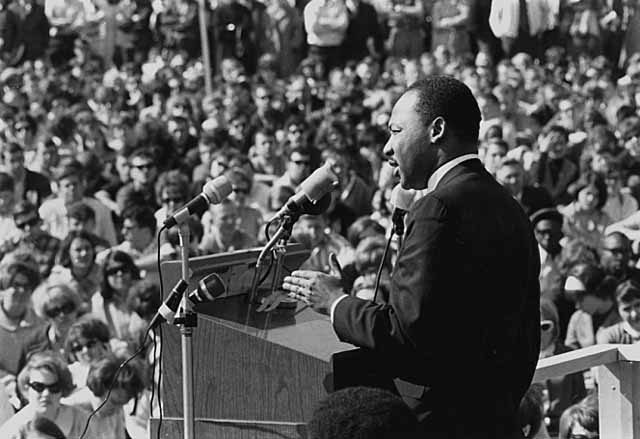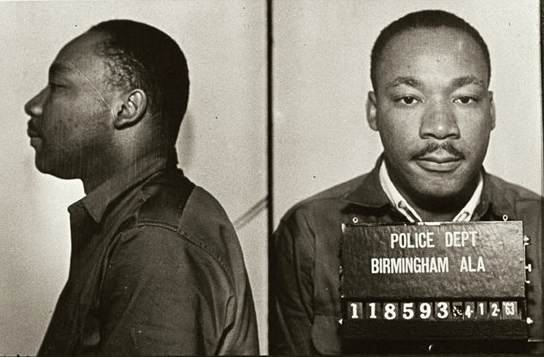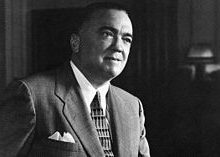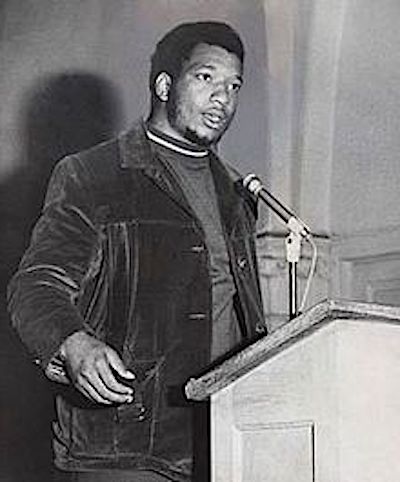In 2017, when the FBI hailed the civil rights leader for PR reasons in a tweet, Ben Norton issued a reminder about the agency’s ugly history.

King speaking to an anti-Vietnam war rally at the University of Minnesota in St. Paul, April 27, 1967. (Minnesota Historical Society, CC BY-SA 2.0, Wikimedia Commons)
 “First they ignore you. Then they ridicule you. And then they attack you and want to burn you. And then they build monuments to you,” declared socialist leader and union organizer Nicholas Klein in 1914 (in a quote often misattributed to Mahatma Gandhi). Klein added, “In this story you have a history of this entire movement.”
“First they ignore you. Then they ridicule you. And then they attack you and want to burn you. And then they build monuments to you,” declared socialist leader and union organizer Nicholas Klein in 1914 (in a quote often misattributed to Mahatma Gandhi). Klein added, “In this story you have a history of this entire movement.”
In 2017, nearly 50 years after his murder, Martin Luther King Jr. was lionized by the very forces that ridiculed, attacked, and wanted to burn him. The same government institutions that threatened King’s life and called him the “most notorious liar in the country” and a “filthy, abnormal animal” applauded him.
The radical legacy of the civil rights icon — who not only valiantly fought Jim Crow, but also harshly condemned capitalism and spoke out bravely against the U.S. war in Vietnam, alienating the vast majority of the liberal establishment — has been so thoroughly whitewashed that the very same government institutions that wished death on King are now heaping praise on his memory.
In 2017, on Martin Luther King Day, the Federal Bureau of Investigation posted a tweet honoring “Rev. Martin L. King Jr. and his incredible career fighting for civil rights.”

King was arrested in 1963 for protesting the treatment of blacks in Birmingham. (Wikimedia Commons)
What the FBI did not mention in its tweet is that King, who was arrested 30 times in his life, was a primary target of COINTELPRO — the FBI’s Counter Intelligence Program that spied on, threatened, and even assassinated revolutionary leaders in the black liberation, socialist, and anti-imperialist movements.
The FBI relentlessly harassed and threatened King. It listened to his phone calls. It spied on his romantic affairs. It taunted him and repeatedly called his house.
After he gave his famous “I have a dream” speech in 1963, the FBI dubbed King the “most dangerous and effective Negro leader in the country.” FBI department heads held a meeting to discuss “a complete analysis of the avenues of approach aimed at neutralizing King as an effective Negro leader.”
In the name of fighting communism, FBI Director J. Edgar Hoover ordered King and his Southern Christian Leadership Conference to be surveilled. The FBI placed dozens of microphones in places King frequented and wiretapped his phones, with the approval of Attorney General Robert F. Kennedy. In order to gauge “the communist influences upon him,” the FBI tracked “all instances of King’s travels and activities.”
When King was awarded the Nobel Peace Prize in October 1964, the FBI was incensed. In an infamous November press conference, the FBI’s Hoover slammed King as “the most notorious liar in the country.” Off the record, Hoover also called the civil rights icon “one of the lowest characters in the country.”

FBI Director J. Edgar Hoover.
A few days after the press conference, the FBI sent King a chilling anonymous letter, blackmailing him and telling him to kill himself. The FBI called King an “evil, abnormal beast” and a “complete fraud and a great liability to” black Americans. “Your end is approaching,” the FBI wrote, describing him as “not a leader but a dissolute, abnormal moral imbecile.”
Through its surveillance, the FBI gathered evidence of King’s sexual dalliances, and threatened to expose them to the world. “You are done… I repeat you are done… You are finished… King you are done… You are done,” the letter reiterated.
“King, there is only one thing left for you to do. You know what that is,” the FBI concluded, strongly hinting at suicide. “You are done. There is but one way out for you. You better take it before your filthy, abnormal fraudulent self is bared to the nation.”
King persevered for three more years until his assassination in 1968. In 1999, a jury decided in a Tennessee civil suit that the U.S. government was complicit in the killing of King.
A March 1968 FBI memo, from the month before King’s death, discussed ways to “prevent the rise of a ‘messiah’ who could unify, and electrify, the militant black nationalist movement.” The memo, which is redacted, hinted that a leader like King “could be a real contender for this position should he abandon his supposed ‘obedience’ to ‘white liberal doctrines’ (nonviolence) and embrace black nationalism.”
“Through counter-intelligence it should be possible to pinpoint potential trouble-makers and neutralize them,” the memo added. The next year, the FBI was involved in the murder of Fred Hampton, the chairman of the Illinois chapter of the Black Panther Party and another potential “black messiah” the agency had targeted.

Fred Hampton.
Five decades later, however, despite their well-documented history of trying to destroy King, the FBI and other government institutions now use him to try to whitewash their sordid histories.
The real King was an uncompromising political radical. He recognized that the U.S. government was “the greatest purveyor of violence in the world.” He implored people to “question the capitalistic economy” and insisted, “We can’t solve our problem now until there is a radical redistribution of economic and political power.”
King linked white supremacy to imperialism and Jim Crow in the U.S. to apartheid in South Africa. When he came out against the barbaric war in Vietnam, which would leave millions dead, he was castigated by liberals and conservatives alike. The editorial boards of The New York Times and The Washington Post cast their scorn on King; on one day, 168 separate newspapers berated him.
Yet King persisted. He declared that “the evils of racism, economic exploitation, and militarism are all tied together, and you really can’t get rid of one without getting rid of the others.” He also said activists must must “make it clear that America is a hypocritical nation,” and maintained, “The whole structure of American life must be changed.”
Ben Norton is a journalist and writer. He is a reporter for The Grayzone, and the producer of the “Moderate Rebels“ podcast, which he co-hosts with Max Blumenthal. His website is BenNorton.com, and he tweets at @BenjaminNorton.
This article was first published by Alternet.
The views expressed are solely those of the author and may or may not reflect those of Consortium News.
Please Donate to the Winter Fund Drive.
Before commenting please read Robert Parry’s Comment Policy. Allegations unsupported by facts, gross or misleading factual errors and ad hominem attacks, and abusive or rude language toward other commenters or our writers will not be published. If your comment does not immediately appear, please be patient as it is manually reviewed. For security reasons, please refrain from inserting links in your comments, which should not be longer than 300 words.

Speaking of the Kennedys, and specifically Bobby’s support for surveilling MLK, here’s a quote from an article by David Wise, NEW YORK REVIEW OF BOOKS, November 11, 1976 Issue,
“…his [RFK’s] associates claimed that the pressure to tap King had come from Hoover, and that Kennedy had gone along with it to disprove FBI suspicions of King’s alleged communist ties. William Sullivan, who headed the FBI division that
handled the wiretapping, supported the version of Kennedy’s friends when I [Wise] talked to him.
Asked whether the idea of tapping King came from the Attorney General or from Hoover,
Sullivan told me, “Not from Bobby. It came from Hoover. He sent down a memo. He wanted
King given the full treatment. The whole impetus came from us.” He added, “I do know that
Bobby Kennedy resisted, resisted, and resisted tapping King. Finally we twisted the arm of the
Attorney General to the point where he had to go. I guess he feared we would let that stuff go in
the press if he said no. I know he resisted the electronic coverage. He didn’t want to put it on.”
President Truman once expressed fears that the FBI could turn into an ‘American Gestapo’.
Sadly, his fears were all too prescient.
It is likely that Hoover gave a blackmail dossier to Lyndon Johnson which allowed him to force his way onto the ticket in 1960. That Johnson met Kennedy, resulting in a change of running mate, is confirmed by Clark Clifford in his memoirs ‘Counsel to the President’. JFK asked Clifford to pass on the news to his original, but not yet announced, choice of Senator Stuart Symington.
The FBI was also involved in the JFK assassination cover-up. Hoover was probably involved in the assassination plot itself so that his compulsory retirement could be waived. It soon was by Executive Order.
‘The Plot to Kill King’ by William F. Pepper deals with the assassination of Martin Luther King.
If Hoover was involved, then, given their close links over many years, President Johnson would likely be involved too.
FBI & CIA are the gatekeepers of the matrix constructed for the American populace by the corporate state. Both agencies are implicated in the assassinations of both KING and JFK.
The government vilified him, then had him shot. Since his family’s civil case, we are past the point at which journalistic responsibility requires we speak of that as hypothetical.
A formative moment for me came watching the evening news at home on one more occasion some time in the middle ’60s. A policeman struck a protester who was sitting cross-legged, sending his glasses into the street, and then continued to beat him as he dragged him off, still cross-legged and arms still folded over his chest.
“Why is it alright for the police to do that?” I asked.
“Because the man is making trouble,” my self-identified liberal Democratic mother responded.
I have been looking at that scene now for a long time.
Instead of naming itself, The Federal Bureau of Investigation, ( FBI) maybe , with its awful history, it should be renamed Federal Investigative Bureau, aka FIB. That seems a better fit for its history.
This is a better link to the King “suicide” letter, not behind a NY Times paywall:
See: en.wikisource.org/wiki/FBI%E2%80%93King_suicide_letter
There is no limit to the depravity and hypocrisy of the powers that be in the United States. When I think of what happened to people like Martin Luther King, Fred Hampton, Malcolm X and others who could have succeeded in transforming America, I am filled with sorrow and rage.
In a remarkable speech at the Hoover Institution last week, Pompeo termed the Soleimani assassination “the restoration of deterrence” and appeared to promise other such operations against other nations Washington considers adversaries. Ominously enough, Pompeo singled out China and Russia.
It’s always handy to have the US government tell us in their own words how evil they actually are.
It actually went beyond far beyond vilification.
To threats and police-state behavior.
The FBI has such a shameful history in fact that I often am amused by those pointing to its recent role in working against Trump as though it were somehow out of character.
It has always been bent to serving political interests and demonstrated remarkably little concern for justice or rule of law over its history.
It is a tool of the establishment state, not all that different in a good deal of its behavior from East Germany’s old Stasi.
Right you are. Very well said.
I am disappointed that the article’s author seems to have taken the FBI’s claim of King’s alleged infidelities at face value. Hoover was as eager to collect negative information about his targets whatever their source and credibility, and its agents were also known to coerce people personally close to their targeted individual and put the FBI’s preferred lies and disinformation into their mouths as their official record. Coretta Scott King never found the claims of her husband’s alleged infidelities as credible, so neither have I.
A great deal of the “dirt” the FBI collected on people was gossip, misinformation, and disinformation planted by the FBI itself,